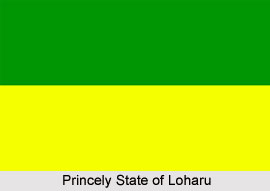 The Princely State of Loharu was one of the 9 Gun Salute states of India and was part of the Punjab States Agency during the rule of the British Empire in India. The territory covered a total area of 570 sq km and was located in the south east part of the undivided Punjab province. It was situated between the Rajputana Agency and the district of Hissar. In the year 1901, the population of the princely state was 15,229 and the population of the Loharu town was 2,175. The town of Loharu derived its name from the blacksmiths of the area, known as Lohars, who were employed in the minting of coins for the former princely state of Jaipur. In the year 1803, Ahmad Baksh Khan established the princely state of Loharu. The British East India Company presented the Loharu town to Ahmad Baksh Khan as a reward for his loyal services against the Jat rulers of the state of Bharatpur. He also received the pargana of Firozepur Jirka, which is presently in the district of Gurgaon. Loharu is now situated in the Bhiwani district in the state of Haryana.
The Princely State of Loharu was one of the 9 Gun Salute states of India and was part of the Punjab States Agency during the rule of the British Empire in India. The territory covered a total area of 570 sq km and was located in the south east part of the undivided Punjab province. It was situated between the Rajputana Agency and the district of Hissar. In the year 1901, the population of the princely state was 15,229 and the population of the Loharu town was 2,175. The town of Loharu derived its name from the blacksmiths of the area, known as Lohars, who were employed in the minting of coins for the former princely state of Jaipur. In the year 1803, Ahmad Baksh Khan established the princely state of Loharu. The British East India Company presented the Loharu town to Ahmad Baksh Khan as a reward for his loyal services against the Jat rulers of the state of Bharatpur. He also received the pargana of Firozepur Jirka, which is presently in the district of Gurgaon. Loharu is now situated in the Bhiwani district in the state of Haryana.
History of Princely State of Loharu
Sams-ud-din Khan, the eldest son of Ahmad Baksh Khan, succeeded him in the year 1827, but his rule did not last long. Sams-ud-din was executed by the British administration in the year 1835 for his involvement in the conspiracy to murder Sir William Frazer, the Resident of British India to Delhi. Eventually the British Government of India took away the pargana of Firozepur (Ferozepur) and the administration of the princely state of Loharu was handed over to his brothers Zia-ud-din and Amin Ud-din Ahmad Khan. After the great revolt of 1857, both of them were kept under supervision for a while and were later released. Their positions ware also restored later. Mahal Sara was the haveli or mansion of the Nawab of Loharu which is situated in Gali Qasim Jan, Ballimaran. Renowned poet Mirza Ghalib, his son-in-law, resided in the haveli for a number of years.
Amin ud-din Khan, was succeeded by his son Alauddin Ahmed Khan in the year 1869 and was given the title of Nawab. Amir ud-din Ahmad Khan, son of Alauddin Ahmed Khan, succeed him in 1884 after governing the state on behalf of his father. He served as an administrator and adviser of the state of Malerkotla from 1893 to 1903. During this period, the princely state of Loharu was managed by Bashiruddin Ahmed Khan his younger brother. Amir ud-din Ahmad Khan was honoured with the Knight Commander of the Order of the Star of India (KCSI) by the British Government of India in the year 1903. He was also granted a 9 gun personal salute from 1st January 1903. Later he was appointed as a member of the legislative council of the Viceroy of India. He abdicated Aizzuddin Ahmad Khan, his second son, in the year 1920. He died in 1926 and left the administration of the princely state to his son Amin ud-din Ahmad Khan, who became the last Nawab of the princely state of Loharu. But as the new ruler was still a minor at the time, Amir ud-din Ahmad Khan governed the state until Amin ud-din reached the age of majority in the year 1931.
After the withdrawal of the British administration and independence of India on 15th August 1947, the Princely State of Loharu was acceded to the newly formed Dominion of India, also called the Union of India. Most of the members of the ruling family and the muslim populace of the region settled in Lahore that was located in Pakistan. However, the Nawab of the erstwhile Loharu and his direct descendants stayed in India. After the Indian Independence, the former Nawab of the princely state of Loharu, Amin ud-din Ahmad Khan, served in the Indian Army and participated in the Liberation of Goa in 1961. Later he was elected to the Legislative Assembly of Rajasthan state and became the Governor of Himachal Pradesh in 1977 and the Governor of Punjab in the year 1981.
Nawabs of Princely State of Loharu
* Ahmad Bakhsh Khan (1806- 1827)
* Sams-ud-din Khan (1827- 1835)
* Amin ud din Ahmad Khan (1835- 1869)
* Allauddin Ahmad Khan (1869- 1884)
* Amiruddin Ahmad Khan, KCSI (1884- 1920)
* Azizuddin Ahmad Khan (1920- 1926)
* Aminuddin Ahmad Khan II (1926- 15 August 1947)






































